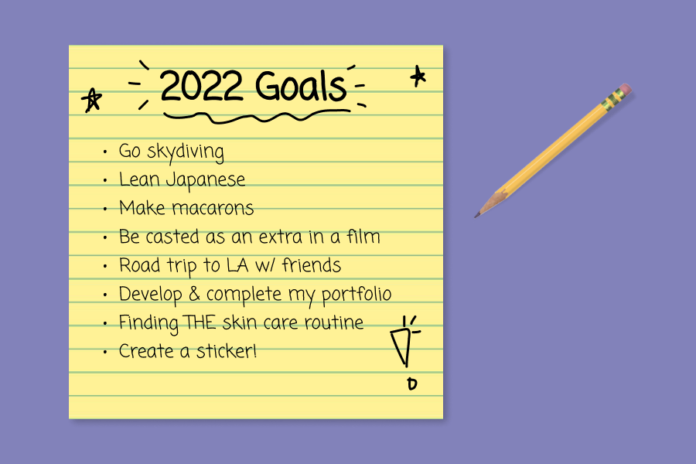A UC Davis Health clinical psychologist shares strategy for making, and sticking to, goals this year
By MAYA SHYDLOWSKI — features@theaggie.org
Losing weight and getting healthy are some of the most common “New Year’s resolutions” people set. According to data collected by Bloomberg, gym memberships spike during January and reliably begin to fall off in February. People’s dedication to their resolutions wears off, but for that month — or two — lots of people seem bent out of shape about getting into shape.
While these “health” resolutions can be achieved, a new wave of resolutions is gaining popularity that is quite different. Many people are choosing to look within and setting goals focused on improving their relationships or mental health, whatever that means to them. Others are focusing on giving back to their communities.
A UC Davis Department of Psychiatry and Behavioral Sciences article published in January 2020 proposed that students set goals that differed from the classic resolution repertoire. It suggested skipping the most common resolutions and instead urged students to prioritize their mental health, including tips for improving mental health in order to have a happier and more productive year. These tips include ones that focus on personal self-care but also on being patient with others and focusing on joy.
Nicole August, a fourth-year psychology major, said that each year, she re-affirms a continuing goal to share what is on her mind with those around her more.
“I always try every year to be more proactive on the things I say in my mind,” August said. “If I see a person with cool shoes, I try to tell them; if I’m thinking of someone, I should text them; if I want to get someone flowers, I should go get them.”
Other alternative New Year’s resolutions focus on being more eco-friendly by opting for a more sustainable lifestyle. A small goal could be deciding not to buy any plastic water bottles this year or putting on an extra sweater instead of turning up the thermostat. A more life-altering resolution could be choosing to eat a vegetarian diet or commit to “meatless Mondays.”
Whether you decide to make small or big resolutions, Dr. Angela Drake, a clinical professor in the Department of Psychiatry and Behavioral Sciences and a clinical psychologist at UC Davis Health, said that staying on track comes down to the approach.
“What you want to do when you’re defining or developing goals is to try to set yourself up for success,” Drake said. “New Year’s resolutions, the way they’ve been historically done, don’t set people up for success.”
Drake said that a more successful approach to goals, which could be applied to a New Year’s resolution, is the “S.M.A.R.T” method, an acronym that stands for specific, measurable, achievable, realistic and timely goals. Drake said that she also adds a “C,” for consistency, to the end of the acronym.
Drake gave an example of how to use the S.M.A.R.T. method to set a goal. Drake said if you want to volunteer more, decide that you will volunteer with one organization or multiple organizations twice per month, every month — which makes the resolution both specific and measurable. She added that for most people, volunteering twice per month is also achievable and realistic, but what is achievable and realistic depends on the individual’s schedule, as well as whether or not the organization is nearby and its mission is something one is passionate about. New Year’s resolutions are goals for the whole year, setting a timely window for their achievement. Finally, Drake said that by making your volunteering monthly, you are setting up consistency, fulfilling her additional C for the consistency step.
Drake also shared one of her own alternative New Year’s resolutions: striving to be more connected to and have more social engagement with the people around her.
“My idea was that when I saw somebody, I would smile and say hello, and that might make their day a little better,” Drake said. “It was kind of like this idea of paying it forward. I actually made that a goal — and sometimes, it didn’t go over well. People would look at me like ‘What does that lady want?’ but a lot of times, people would respond back and smile, and then it made me feel better too, which is called getting positive feedback.”
Drake said that having positive feedback is another important part of making and keeping a resolution, because being “rewarded” for keeping a goal incentivizes you to continue it. Positive feedback can come from the experience itself, like getting a smile back from someone in Drake’s case, but reward can also be personal. Drake suggested not only choosing goals that will make you feel good about yourself, but also planning rewards for yourself for following through with the goals. This could be treating yourself to a coffee or watching your favorite movie after each month you complete your goal’s steps.
Drake’s biggest point is that when setting up whatever resolution you choose to make, make sure to set yourself up for success — because in her experience, people’s unmet resolutions can sometimes do more harm than good.
“I think [unfulfilled esolutions] feed into the internal dialogue that people have with themselves that they’re a failure or that they’re not able to change, and I think that’s unfortunate,” Drake said. “I have known many people who just won’t do New Year’s resolutions anymore because they don’t think they’re realistic and the resolutions don’t make them feel happy or successful.”
This January, if you choose to make a resolution for 2022, find a goal you believe in and want to achieve, and then make a plan that sets yourself up to complete it successfully.
“You have to be positive,” Drake said. That’s really an important part of achieving change, which is what New Year’s resolutions are about. You have to believe that you can do it.”
Written by: Maya Shydlowski — features@theaggie.org




